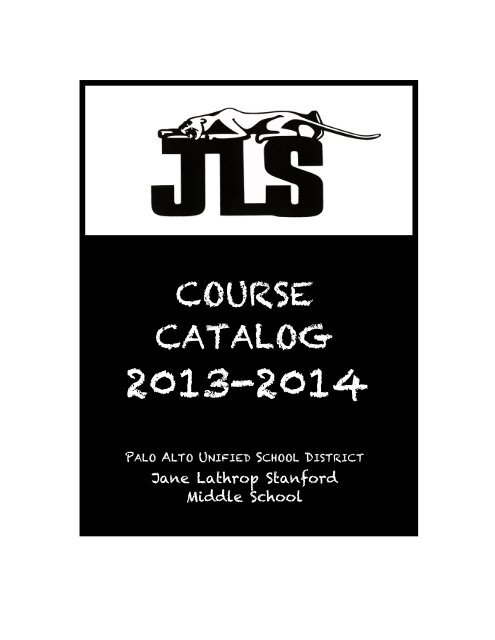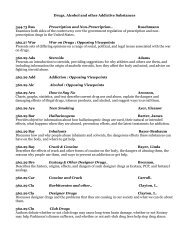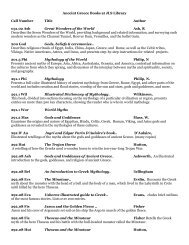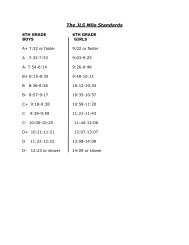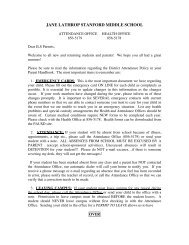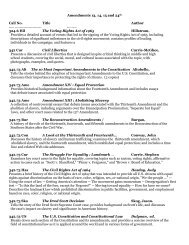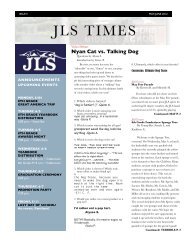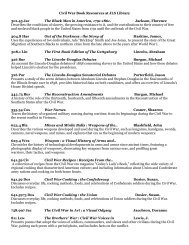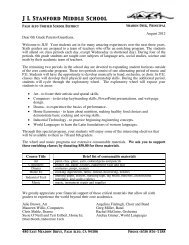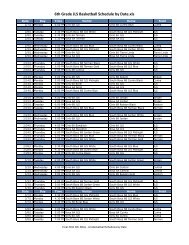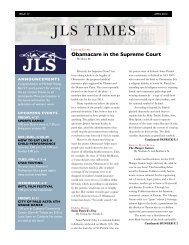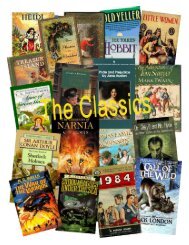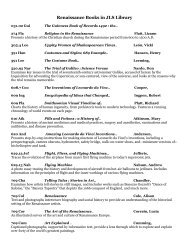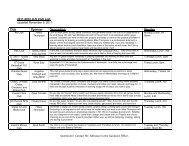Course Catalog - Jane Lathrop Stanford Middle School - Palo Alto ...
Course Catalog - Jane Lathrop Stanford Middle School - Palo Alto ...
Course Catalog - Jane Lathrop Stanford Middle School - Palo Alto ...
You also want an ePaper? Increase the reach of your titles
YUMPU automatically turns print PDFs into web optimized ePapers that Google loves.
COURSE<br />
CATALOG<br />
2013-2014<br />
PALO ALTO UNIFIED SCHOOL DISTRICT<br />
<strong>Jane</strong> <strong>Lathrop</strong> <strong>Stanford</strong><br />
<strong>Middle</strong> <strong>School</strong>
PALO ALTO UNIFIED SCHOOL DISTRICT<br />
<strong>Jane</strong> <strong>Lathrop</strong> <strong>Stanford</strong><br />
<strong>Middle</strong> <strong>School</strong><br />
COURSE<br />
CATALOG<br />
2013-2014<br />
Grades 6, 7, 8<br />
TABLE OF CONTENTS<br />
INTRODUCTION .......................................................................................................................... 1<br />
6 th Grade Program .................................................................................................................................................................... 3<br />
7 th Grade Required <strong>Course</strong>s ...................................................................................................................................................... 5<br />
8 th Grade Required <strong>Course</strong>s ...................................................................................................................................................... 6<br />
SUPPORT PROGRAMS .................................................................................................................. 7<br />
After <strong>School</strong> Support Programs ................................................................................................................................................ 9<br />
<strong>School</strong>wide Portfolios & Exit Interviews .................................................................................................................................... 9<br />
MASTER LIST OF SELECTIVES ...................................................................................................... 10<br />
Full-Year Selectives ................................................................................................................................................................ 11<br />
Semester Selectives ............................................................................................................................................................... 13<br />
Page
English/Language Arts<br />
History/Social Studies<br />
Mathematics<br />
Science<br />
Physical Education/Music<br />
(alternate days)<br />
Exploratory Wheel<br />
INTRODUCTION<br />
MIDDLE SCHOOL COURSE OVERVIEW<br />
REQUIRED COURSES<br />
Guidance Department: 856-5182<br />
COURSES<br />
Grade 6* Grade 7* Grade 8*<br />
English/Language Arts<br />
History/Social Studies<br />
Mathematics<br />
Science<br />
Physical Education<br />
Elective<br />
Elective<br />
* All students will have Wednesday Instructional Period (WIP).<br />
1<br />
English/Language Arts<br />
History/Social Studies<br />
Mathematics<br />
Science<br />
Physical Education<br />
Elective<br />
Elective<br />
PLEASE NOTE: This catalog must be produced before decisions about budget and staffing are made for the 2013-2014 school year.<br />
Although we hope to offer all of these classes, we may have to cancel some. We will cancel any which do not have sufficient enrollment<br />
(24 students in most cases.) It is very important that students indicate their first seven choices in the order desired.<br />
NOTE: Students and their parents have several important decisions to make in planning a school program. No catalog can answer all<br />
your questions, so don’t hesitate to speak to your teacher or counselor to get more information or assistance. Students are assigned a<br />
counselor based on grade level.<br />
Choice Options<br />
Connections 6 th , 7 th , and 8 th Grade<br />
While we hope all students are in this program for all three years, you may apply for this program at all three grade levels. A lottery is<br />
held for open spots at each grade level.<br />
The Connections program focuses on project-based learning and stresses student choice and responsibility. Through innovative and<br />
progressive teaching practices, students are challenged and actively engaged in their education.<br />
We Believe<br />
1. Teaching for Thinking: Connecting Hearts and Minds<br />
Through project-based learning, students gain and practice the higher order and critical thinking skills necessary for analyzing,<br />
creating and problem solving. Students have opportunities to choose topics of interest and follow their passions.<br />
2. Teachers as Coaches/Mentors: Connecting Students and Teachers<br />
Teachers act as coaches or facilitators and provide personalized feedback and written evaluations. Students take responsibility for<br />
their own work and progress.<br />
3. Meaningful, Challenging Curriculum: Connecting the Curriculum<br />
Using differentiated curriculum that follows the state and district guidelines, students solve problems using real world applications.<br />
Topics of study are enhanced with relevant field trips, guest speakers and current events. Research projects and units focus on<br />
depth vs. breadth.
4. Collaboration and Cooperation: Connecting the Learning Community<br />
Students work in self-directed groups fostering collaborative learning and positive social interactions. Students develop their skills<br />
as leaders, facilitators and collaborators.<br />
5. Parent/Teacher/Child/Community: Connecting Home and <strong>School</strong><br />
Parents are encouraged to participate in the program. Teachers are open and accessible to parents.<br />
2
6 TH GRADE PROGRAM<br />
Sixth grade core (five periods of the day) covers the subjects of English/Language Arts, History/Social Studies, Science, and Math.<br />
Teachers are grouped in two- or three-member teams. These teams share responsibilities for curriculum in different ways.<br />
English 6<br />
Sixth grade students build their English and Language Arts skills in the areas of reading, writing, listening, and speaking within the<br />
context of core literature units including novels, short stories, poetry, and mythology. Teachers use a variety of texts to develop literature<br />
units focusing on literary elements, vocabulary development, reading comprehension, and response to literature. Students practice the<br />
conventions of language (grammar, spelling, punctuation, capitalization, etc.) in required writing assignments, teacher developed writing<br />
lessons, and grammar text lessons. Writing domains emphasized include Autobiographical Incident, Report of Information, and<br />
Persuasive Essay. Teachers develop writing units from selected materials including the PAUSD Writing Binder and focus on the<br />
development of the traits of good writing. Students practice speaking and listening skills through formal speeches, presentations<br />
(individual and group), discussions, and conversations.<br />
History / Social Science 6<br />
Students will be introduced to ancient world history and will study significant periods of history that have altered and shaped human society,<br />
such as the Agricultural Revolution that transformed our pre-historic humans’ hunter-gatherer societies into settled farming-herding cultures.<br />
Students will learn about the foundational elements that formed civilizations and will specifically study ancient world civilizations of Africa,<br />
Asia, the <strong>Middle</strong> East, and Europe.<br />
Through the use of textbooks, teacher selected materials, and research, students will learn about the geographical, social, political,<br />
religious, and economic systems of these cultures, and how various societies developed these systems.<br />
Throughout the year students will develop historical analysis skills, research, note-taking, multiple perspectives, and presentation skills,<br />
as well as participate in a variety of classroom activities such as Socratic discussions and simulations<br />
Students will investigate past to present connections as they learn that contemporary cultures are the descendants of earlier civilizations<br />
and are influenced by historical events. By studying the characteristics of these civilizations, students will become more aware of, and<br />
learn to appreciate and value, the ethnic and cultural diversity in our own society and the contributions these diverse civilizations have<br />
made to our modern world.<br />
Science 6<br />
This one-year, activity based course follows the California State Science and District Standards for 6 th grade. This is a hands-on curriculum<br />
emphasizing earth science, ecology, and botany. Units taught may include: landforms (processes of erosion and deposition), earth history<br />
(earth’s interior, convection, plate tectonics, volcanic activity, earthquakes), ecology, and “Fast Plants” experiments with miniature mustard<br />
plants with supporting instruction about plant biology. A variety of field trip experiences enhance the curriculum. Students will be mentored<br />
and encouraged to extend their science activities beyond the classroom at the annual JLS Science Fair.<br />
Math<br />
All students study the mathematical strands recommended by the California Framework of number sense, measurement, geometry,<br />
patterns and functions, statistics and probability, logic and language, and algebra. Focus is placed on problem-solving, conceptual<br />
understanding, building connections throughout the strands, and developing computational skills. Students solve problems,<br />
communicate ideas in both oral and written form, analyze and organize information, evaluate alternative mathematical approaches, and<br />
interpret results. Students use mental math, estimation, paper and pencil computation, manipulative models, calculators, computers,<br />
and other technology as appropriate. Students are heterogeneously grouped in 6 th grade and work both independently and in<br />
cooperative group situations with instruction that is differentiated to appropriately challenge students. Extension and enrichment<br />
opportunities are available to all students.<br />
3
Music / Physical Education<br />
During one period, sixth grade students spend alternate days in Music and Physical Education. Sixth grade music students continue to<br />
develop as musicians and performers. There is a focus on building a strong foundation using proper posture, breath control, tone<br />
production, and reading music. In addition, students perform several times a year. Physical Education consists of a program of<br />
activities that are designed to develop good basic motor skills, nutrition, physical fitness, and fundamental movement patterns.<br />
Emphasis is placed on the importance of positive sportsmanship and cooperation, including respect for one another.<br />
Exploratory Wheel<br />
The remaining period for 6 th graders is the Exploratory Wheel. Students receive approximately six weeks of instruction in Art,<br />
Computer Applications, Drama, Home Economics, Industrial Technology, and the Language Transfer Program. These courses<br />
will provide students an introduction to courses which they may choose as electives in 7 th and 8 th grade.<br />
4
English 7<br />
7 TH GRADE REQUIRED COURSES<br />
Seventh grade students continue to build their English and Language Arts skills in the areas of reading, writing, listening, and speaking.<br />
These abilities are developed within the context of core literature units including novels, short stories, poetry, and a play. Core literature at<br />
this level includes The Diary of Anne Frank, and The House on Mango Street. Extended core is Roll of Thunder, Hear My Cry, and several<br />
teachers are currently piloting Phineas Gage: A Gruesome But True Story About Brain Science. Teachers develop other literature units<br />
from a variety of supplemental texts, including novels, short stories, and poetry, as well as the McDougal Littell anthology. Students<br />
practice the conventions of language (grammar, spelling, punctuation, capitalization, etc.) in required writing assignments, teacher<br />
developed writing lessons, and grammar text lessons. Students practice speaking and listening skills through formal speeches and<br />
conversations, individual and group presentations, and small group discussion. Our students learn to view multi-media resources with a<br />
critical eye; they are also given opportunities to create and present their own multi-media projects. Teachers develop writing units from<br />
selected materials including the PAUSD Writing Binder and focus on the development of the traits of good writing.<br />
History / Social Science 7<br />
Students will connect their past studies of world history to new studies of medieval world history in Asia, Africa, the <strong>Middle</strong> East, Europe,<br />
and the Americas from approximately 100 A.D. through 1700 A.D.<br />
Through the use of textbooks, teacher selected primary and secondary source materials, and research, students will learn about the<br />
social, political, religious, and economic systems of these cultures, and how various societies developed these systems.<br />
Throughout the year students will develop historical analysis skills, research, note-taking, multiple perspectives, and presentation skills,<br />
as well as participate in a variety of classroom activities such as Socratic discussions and simulations.<br />
Students will investigate past to present connections as they learn that contemporary cultures are the descendants of earlier civilizations<br />
and are influenced by historical events. By studying the historical, political, economic, religious, and social implications of these world<br />
cultures, students will become more aware of, and learn to appreciate and value, the ethnic and cultural diversity in our own society and<br />
the modern world.<br />
Mathematics 7 Pre-Algebra, Pre-Algebra Advanced<br />
Students in grade seven study the mathematical strands recommended by the California Framework: Number Sense, Algebra and<br />
Functions, Measurement and Geometry, Statistics, Data Analysis and Probability, and Mathematical Reasoning.<br />
Students will solve problems, communicate ideas in both oral and written form, analyze and organize information, evaluate alternative<br />
mathematical approaches, and interpret results. Students will compute using paper and pencil, mental arithmetic, computers, and<br />
calculators.<br />
By the end of 7 th grade, students are expected to be adept at manipulating numbers and basic equations. Students will be placed in<br />
Pre-Algebra or Pre-Algebra Advanced based on their achievement in Math 6.<br />
Physical Education<br />
Physical Education consists of a program of activities that are designed to develop good basic motor skills, nutrition, physical fitness and<br />
fundamental movement patterns. Emphasis is placed on the importance of positive sportsmanship and cooperation, including respect<br />
for one another. Students are provided an introductory exposure to a wide variety of activities, including team sports, individual and<br />
dual sports, rhythms and aquatics.<br />
Science 7<br />
This one-year activity-based course follows the California State and District Science Standards for 7 th grade. The standards include the<br />
following broad topics: Cell Biology, Genetics, Evolution, Earth and Life History, Structure and Function in Living Systems, Physical<br />
Principals in Living Systems, Investigation and Experimentation.<br />
Scientific aspects of human life are incorporated with study of structure and function in living systems. While exploring the various Life<br />
Science concepts, students will be engaged in class and homework activities that also stress writing, reading, and math skills.<br />
5
English 8<br />
8 TH GRADE REQUIRED COURSES<br />
Eighth grade students continue to build their English and Language Arts skills in the areas of reading, writing, listening, and speaking.<br />
These abilities are developed within the context of core literature units including novels, short stories, and poetry. Core literature in the<br />
eighth grade includes The Adventures of Tom Sawyer, and The Pearl. Teachers develop other literature units using a variety of<br />
supplemental texts, including novels, short stories, poetry, and the McDougal Littell anthology. Students practice the conventions of<br />
language (grammar, spelling, punctuation, capitalization, etc.) in required writing assignments, teacher developed writing lessons, and<br />
grammar text lessons. Students practice speaking and listening skills through formal speeches and conversations, individual and group<br />
presentations, and small group discussion. Our students learn to view multi-media resources with a critical eye; they are also given<br />
opportunities to create and present their own multi-media projects. Teachers develop writing units from selected materials including the<br />
PAUSD Writing Binder and focus on the development of the traits of good writing.<br />
History / Social Science 8<br />
Students will connect their past studies of American history to new studies of the foundations of the United States including the social,<br />
economic, religious, political, and geographical growth of the nation from the mid-1700's to the turn of the 20th century.<br />
Through the use of textbooks, teacher selected materials, and research, students will learn about the causes of the Revolutionary War,<br />
creation and implementation of the Constitution, formation of political parties, foreign policies and conflict between nations, the Westward<br />
Movement (Manifest Destiny), slavery and the Civil War, Reconstruction, and the Industrial Revolution. The students will learn about the<br />
diverse peoples who immigrated to America and their profound influence in America's development.<br />
Throughout the year students will develop historical analysis skills, research, note-taking, multiple perspectives, and presentation skills,<br />
as well as participate in a variety of classroom activities such as Socratic discussions and simulations.<br />
Students will investigate past to present connections as they learn that contemporary society has been influenced by historical events.<br />
By studying the ethical, social, political, and economic questions Americans have dealt with historically, students will be more aware of,<br />
and sensitive to, the issues facing America today.<br />
Mathematics 8: Introduction to Algebra, Algebra 1<br />
Students continue their study of the strands recommended by the California Framework: Number Sense, Algebra and Functions,<br />
Measurement and Geometry, Statistics, and Mathematical Reasoning.<br />
Students continue to use and improve their skills in problem-solving, communicating mathematical ideas in oral and written form, analyzing<br />
complex situations, organizing information, using computers and graphing calculators, and working independently and in groups.<br />
By the end of 8th grade, Intro to Algebra students have begun to develop an understanding of symbolic reasoning and calculations with<br />
symbols. Algebra 1 students are expected to have a deeper understanding of the symbolic language of mathematics, algebraic skills,<br />
concepts, and problem solving.<br />
Physical Education<br />
Physical Education consists of a program of activities that are designed to develop good basic motor skills, nutrition, physical fitness and<br />
fundamental movement patterns. Emphasis is placed on the importance of positive sportsmanship and cooperation, including respect<br />
for one another. Students are provided an introductory exposure to a wide variety of activities, including team sports, individual and<br />
dual sports, rhythms and aquatics.<br />
Science 8<br />
This one-year activity-based course follows the California State and District Science Standards for 8th grade. The standards include the<br />
following broad topics: Investigation and Experimentation, Motion, Forces, Energy, Structure and Properties of Matter, Periodic Table,<br />
Chemical Reactions, Chemistry of Living Things, Stars and Star Cycles, and the Solar System.<br />
While exploring the various Physical Science concepts, students will be engaged in classroom and homework activities that also stress<br />
writing, reading, and math skills.<br />
6
SUPPORT PROGRAMS<br />
JLS offers a variety of programs designed to assist students to reach their full academic potential and ensure academic success in high<br />
school and beyond. Students are placed in these courses through consultation with counselors, parents, and teachers.<br />
Academic Enhancement<br />
This class is a comprehensive reading/language arts program designed to bring students up to proficiency in literacy skills. The program<br />
includes three comprehensive teaching models: whole group, small group and one-on-one instruction with adaptive technology. This<br />
class meets in blocks of two periods, four times a week. Parents should consult with their child’s counselor for more information.<br />
Academic Language Development (ALD)<br />
This course is designed to support reclassified (students who have exited the ELL program) English Learners in narrative and expository<br />
reading and writing, vocabulary development, and use of spoken language in the core content areas. Effective organization and study<br />
skills will be integrated into the curriculum. This course will prepare Redesignated English Learners for success in using listening,<br />
speaking, reading and writing in preparing for high school. This class takes the place of one elective course.<br />
AVID<br />
This course is designed to assist 7th and 8th grade students in achieving at their full academic potential. Students will work on<br />
enhancing their study skills with the goal of successfully participating in college preparatory classes and eventually attending a four-year<br />
university. In addition, students will learn how to advocate for themselves in academic and non-academic situations. Curriculum includes<br />
tutorial sessions, study skills, curricular enrichment, and personal empowerment to feel validated and recognized in the school setting.<br />
This class takes the place of one elective course.<br />
Special Education<br />
Special Education services are coordinated with middle school instructional programs. Information about middle school programs and<br />
schedules is available from the JLS Special Education staff. Special Education students and their parents should consult with their<br />
current Special Education teachers prior to submitting registration materials for the 2013-2014 school year.<br />
English Language Learners (ELL)<br />
Students who register in the <strong>Palo</strong> <strong>Alto</strong> Unified <strong>School</strong> District must complete a home language survey. If that document indicates that<br />
English is not the student’s primary language, the student must take a state mandated language exam. Those who demonstrate fluency<br />
in speaking, listening, reading and writing are designated fluent and will follow the same schedule as all other mainstream students.<br />
Non-English fluent students receive English language instruction according to the following model.<br />
Sixth grade students in the 6A class of the English Language Learners Program will have two periods of ELL daily for English language<br />
acquisition. The 6B and 6C classes will have only one period of ELL daily. (See chart on the following page.)<br />
Seventh and eighth grade students in the beginning, intermediate, and early advanced range take English Language Learner classes in<br />
place of mainstream English and social studies courses. Some early advanced level students will only be enrolled in an EL English class.<br />
ELL classes will account for two periods of required course work. All other course selections will be made following instruction for all<br />
other 7th and 8th graders.<br />
Please consult with the English Language Development Coordinator if further clarification is necessary.<br />
Math Workshop<br />
This class is intended for students who would like extra help in order to be successful in their math classes. In a supportive environment<br />
with no more than 15-18 students and a math teacher who is familiar with their respective grade level program, students will learn how<br />
to succeed in math through individual and small group tutoring, organizational help, projects, games, and computer programs. This class<br />
is intended for students who are performing below grade level in math and have been recommended by their teacher or guidance<br />
counselor.<br />
7
ELL 6A<br />
! Beginning proficiency level.<br />
! ELL substitutes for mainstream English<br />
and social studies classes.<br />
ENGLISH LANGUAGE DEVELOPMENT CLASSES<br />
ELL 6B<br />
6 TH Grade<br />
! Intermediate proficiency level.<br />
! Replaces social studies class.<br />
* Depending on enrollment, ELL 6A and ELL 6B may be combined<br />
ELL 1 (two periods)<br />
! Beginning proficiency level.<br />
! ELL substitutes for mainstream English<br />
and grade level social studies classes.<br />
7 TH / 8 TH Graders<br />
ELL 2 (two periods)<br />
! Intermediate proficiency level.<br />
! ELL substitutes for mainstream English<br />
and grade level social studies class.<br />
* Depending on enrollment, ELL 1 and ELL 2 may be combined<br />
! ELL World History: 7 th grade ELL 1,<br />
ELL 2. ELL 3 students who are not at<br />
grade level can be recommended.<br />
OR<br />
! ELL U.S. History: 8 th grade ELL 1, ELL 2,<br />
and ELL 3 students who are not at<br />
grade level can be recommended.<br />
8<br />
ELL 6C<br />
! Early Advanced proficiency level.<br />
! Students will work on academic writing<br />
and receive homework support.<br />
ELL 3 (one/two periods)<br />
! Early Advanced proficiency level.<br />
! ELL substitutes for the mainstream<br />
English class and possibly the grade<br />
level social studies class.<br />
! ELL World History: 7 th grade ELL 1,<br />
ELL 2, ELL 3 students who are not at<br />
grade level can be recommended.<br />
OR<br />
! ELL U.S. History: 8 th grade ELL 1, ELL 2,<br />
and ELL 3 students who are not at<br />
grade level can be recommended.
AFTER SCHOOL SUPPORT PROGRAMS<br />
Homework Habitat<br />
Homework Habitat meets in the library from 3:15–4:30 p.m. on Monday, Tuesday and Thursday. It is a quiet place for students to do<br />
their homework and receive academic support from JLS staff and volunteers. Computers for research and word processing are available.<br />
Students are to remain in Homework Habitat until they are ready to leave campus.<br />
SCHOOLWIDE PORTFOLIOS & EXIT INTERVIEWS<br />
The Portfolio Program at JLS provides students with the opportunity to reflect on how they have progressed as learners during their<br />
three years at JLS. <strong>School</strong>wide portfolios contain samples of student work from all subject areas, including PE and electives. Twice a<br />
year, students choose and reflect on pieces of work they would like to include in their schoolwide portfolios. As a result, these portfolios<br />
are examples of students’ academic development ranging over their respective middle school careers, and they serve as supporting<br />
evidence for each student’s focused conversations during exit interviews.<br />
At the end of Eighth Grade, each student prepares for and participates in an Exit Interview, using their schoolwide portfolio. The<br />
interview provides a real world opportunity for students to share their work with an adult in a student-friendly environment. This<br />
experience allows students to practice valuable interpersonal communication skills. In addition, the interview encourages students to<br />
reflect on and showcase their work at JLS.<br />
9
MASTER LIST OF SELECTIVES<br />
FULL-YEAR SELECTIVES SEMESTER SELECTIVES<br />
MUSIC<br />
Band, Advanced+<br />
Band, Symphonic++<br />
Choir<br />
Orchestra<br />
WORLD LANGUAGES<br />
French 1A<br />
French 1B*<br />
German 1A<br />
Japanese 1A<br />
Japanese 1B*<br />
Mandarin 1A<br />
Spanish 1A<br />
Spanish 1B*<br />
Spanish for Spanish Speakers<br />
UNIQUE OFFERING<br />
Yearbook<br />
* Prerequisite<br />
** Permission of staff required<br />
+ 7 th grade only<br />
++ 8 th grade only<br />
! Application required<br />
10<br />
ART<br />
Art 1A<br />
Art 1B (Advanced)*<br />
Art – Multimedia+<br />
COMPUTERS<br />
Broadcast Media (KJLS) *!<br />
Computer Keyboarding/Applications<br />
Computer Programming<br />
Video Production<br />
Web Design 1A<br />
Web Design 1B*<br />
DRAMA<br />
Back Stage Production<br />
Drama 1A<br />
Drama 1B*<br />
Musical Theater<br />
HOME ECONOMICS<br />
Gourmet Cooking (Advanced)*<br />
Skills for Living<br />
INDUSTRIAL TECHNOLOGY<br />
Industrial Technology 1A<br />
Industrial Technology 1B (Advanced)*<br />
UNIQUE OFFERINGS<br />
Creative Writing<br />
Leadership**++!<br />
Public Speaking<br />
<strong>School</strong> Service++<br />
! "<br />
IMPORTANT NOTICE<br />
Every effort is made to schedule your first “Selective” preferences, but often that is not possible. It is important that<br />
you fill out all seven of the selectives in rank order so that your final schedule does include selectives<br />
of your choice.<br />
Please note that only those classes with sufficient enrollment are offered (24 students in most cases).
FULL-YEAR SELECTIVES<br />
MUSIC<br />
Advanced Band <strong>Course</strong> Number 6882<br />
7 th Grade / Year<br />
The 7 th grade Advanced Band performs at formal concerts, the May Fete Parade, and various assembly programs. In addition, Advanced<br />
Band students are eligible to audition for Jazz Ensemble. Daily rehearsals are spent working on the development of music fundamentals<br />
and building ensemble skills. Students will perform music from a variety of genres and styles. Students will be expected to attend<br />
possible after school rehearsals and all performances.<br />
Symphonic Band <strong>Course</strong> Number 6884<br />
8 th Grade / Year<br />
The 8 th grade Symphonic Band performs at formal concerts, assembly programs, parades, festivals and other special events. Students in<br />
Symphonic Band also have the opportunity to travel with the group on an overnight performance tour. Symphonic Band students are<br />
also eligible to audition for Jazz Band. Daily rehearsals are spent working on the development of music fundamentals and building<br />
ensemble skills. Students will perform music from a variety of genres and styles. Students will be expected to attend possible after school<br />
rehearsals and all performances.<br />
Choir 1A <strong>Course</strong> Number 6876<br />
7 th and 8 th Grade / Year<br />
In Mixed Choir, Girls Choir, and Boys Choir, students will develop and improve their voices, and learn about music through performance.<br />
Students will perform a wide variety of choral music. Opportunities exist for those who wish to sing solos or participate in small<br />
ensembles. The Choirs will perform in concerts, assembly programs, community events and festivals. Students will be expected to attend<br />
possible after school rehearsals and all evening performances.<br />
Orchestra <strong>Course</strong> Number 6886<br />
7 th and 8 th Grade / Year<br />
In Orchestra class students work on expanding their string technique, knowledge, and ensemble skills while performing a wide variety of<br />
music of differing styles and genres. The Orchestra performs in formal concerts as well as other activities that have included attending a<br />
CMEA music festival, a tour to elementary schools, performances and activities with the Gunn HS Orchestra, master classes, and possibly<br />
an overnight performance tour. Students enrolled in orchestra are eligible to play in the Chamber Orchestra and String Chamber Music<br />
Club. Students will be expected to attend possible after school rehearsals and all evening performances.<br />
WORLD LANGUAGES<br />
(Formerly Foreign Languages)<br />
FRENCH, GERMAN, JAPANESE, MANDARIN, SPANISH<br />
French 1A<br />
German 1A<br />
Japanese 1A<br />
Mandarin 1A<br />
Spanish 1A<br />
Spanish for Spanish Speakers<br />
French 1B<br />
Japanese 1B<br />
Spanish 1B<br />
IMPORTANT NOTE: Level 1A and 1B classes are designed for students who have NO prior knowledge or exposure to the target<br />
language.<br />
11
Five languages are currently available to students – French, German, Japanese, Mandarin and Spanish. The number of students enrolled<br />
will determine whether the class ultimately will be available. With a pre-enrollment of at least 24 students, beginning language courses<br />
(the 1A series) will be offered.<br />
Each world language course develops self-confidence through the study of a second language and fosters an appreciation for that<br />
language and its culture. Capable students who wish to study more than one language at a time may do so. Homework in world language<br />
classes is given regularly.<br />
Seventh graders enroll in the course numbered 1A. As eighth graders, they continue with the course numbered 1B. This two-year<br />
sequence in middle school is equivalent to the first year of high school study, allowing students to enter level two as freshmen. This is<br />
a great way to get a jump start on the new A-G requirements needed to graduate from high school.<br />
NOTE: Eighth graders are welcome to sign up for 1A classes as preparation for entering level one as freshmen in high school.<br />
General <strong>Course</strong> Descriptions<br />
Students of French, German, Japanese*, Mandarin and Spanish will develop growing proficiency in the four skills of listening, speaking,<br />
reading, and writing, and gain understanding of the structure of the language appropriate to the level of instruction. They will also gain a<br />
familiarity with and appreciation of the culture of the linguistic community.<br />
*NOTE: The Japanese writing systems (Hiragana and Katakana) are introduced gradually during the first year course and Kanji (Chinese<br />
characters) throughout each year.<br />
Spanish for Spanish Speakers is designed for students who are native speakers of Spanish and is composed of 7th and 8th graders. It is<br />
to give students knowledge and appreciation of Spanish-American culture. They will learn to distinguish and value the difference between<br />
colloquial and academic language. They will perfect their writing as well as their speaking ability in Spanish. Placement at the high school<br />
level for Spanish Speakers 2 is determined by the teacher. A grade of “C” is generally necessary to advance to the next level.<br />
Student Outcomes<br />
The expected student outcomes in the five areas of language acquisition are:<br />
LISTENING: To understand the language as it is spoken by a native speaker at a normal conversational rate with the vocabulary<br />
and grammatical structures appropriate to the level of instruction.<br />
SPEAKING: To communicate with reasonable fluency in real-life situations at a level commensurate with the vocabulary and<br />
structure appropriate to the level of instruction.<br />
READING: To read materials appropriate to the level of instruction; both silently and aloud with understanding.<br />
WRITING: To write clearly and correctly within the limits imposed by the vocabulary and grammatical structures at the level of<br />
instruction.<br />
CULTURE: To gain familiarity and appreciation of the culture and to learn differences and similarities in world views, customs,<br />
beliefs, and social conventions of the linguistic community.<br />
UNIQUE OFFERING<br />
Yearbook <strong>Course</strong> Number 6166<br />
7 th and 8 th Grade / Year<br />
Prerequisite: None<br />
This class is designed for highly motivated students who wish to contribute to creating our school yearbook. The majority of the class<br />
will focus exclusively on the design and content of the yearbook. Students will develop skills in digital photography, Web-based design,<br />
and layout.<br />
12
SEMESTER SELECTIVES<br />
Art 1A <strong>Course</strong> Number 6492<br />
7 th and 8 th Grade / Semester<br />
Prerequisite: None<br />
Art 1A is a semester course which may be taken multiple times as the content varies each semester. Students explore the Elements of Art and<br />
basic techniques in both two-dimensional and three-dimensional projects. They learn to appreciate different styles and gain an appreciation<br />
for a variety of artists from various historical periods and cultures. Lessons are in accordance with PAUSD Standards as well as California<br />
Standards for Visual Art. Homework is assigned occasionally and museum visits are encouraged. Some examples of the areas of study<br />
include cartooning, basic drawing and painting techniques, printmaking, collage, and sculpture utilizing clay and wire.<br />
Art 1B (Advanced) <strong>Course</strong> Number 6493<br />
7 th and 8 th Grade / Semester<br />
Prerequisite: Teacher and/or Counselor Approval<br />
With the permission of the above, students are eligible for this more accelerated general art class that will introduce the Principles of<br />
Design. As in Art 1A there will be both two and three-dimensional projects. Students are expected to show an increased level of<br />
commitment and ability in their work. In addition to classroom assignments, all students maintain an individual sketch journal that is<br />
regular homework with guidance and teacher feedback. This course is designed in alliance with the California State Standards for Visual<br />
Art which encompass technique, historical significance, cultural heritage and career connections. This semester course can be taken<br />
multiple times.<br />
Art - Multimedia <strong>Course</strong> Number 6356<br />
7 th and 8 th Grade / Semester<br />
Prerequisite: Art 1A<br />
Do you like using technology for art and design purposes? In this digitally-based art class, you will learn how to use computer software<br />
to create, manipulate, and transform originals works of art. We will explore techniques used by professional photographers, graphic<br />
designers, animators and illustrators. By the semester's end, you can expect to have designed your own logo, drastically altered a<br />
photograph, and created an original book illustration.<br />
Back Stage Production <strong>Course</strong> Number 6899<br />
7 th and 8 th Grade / Semester<br />
Prerequisite: None (Drama 1A is highly recommended)<br />
Students in this class create or expand on their existing theatrical portfolios by exploring Drama from a production standpoint. Working<br />
“behind the scenes,” students draw, sketch and render designs in Google Sketchup. Students may repeat this class if desired, as the<br />
curriculum will change each semester depending on enrollment and shows to produce but will always include opportunities to sew, paint,<br />
hammer, drill, run lights and sound, apply makeup, manage crews and build sets and props for school plays. Some of their work will<br />
appear onstage as part of the JLS Drama program. Some after-school and weekend work will be required. Students will create a<br />
reflective portfolio at the end of the semester showcasing all the work they produced including their pre-production designs and finished<br />
show artifacts.<br />
Broadcast Media (KJLS) <strong>Course</strong> Number 6649<br />
7<br />
13<br />
th and 8th Grade / Semester<br />
Prerequisite: Video Production & Approved Application<br />
Students in this class will learn to produce a live broadcast of the morning announcements. In our own studio, students will use<br />
journalism and video production skills to create news and educational programming including preproduction (planning and preparation<br />
of logos, jingles, public service announcements, and special reports), and production (a variety of jobs both in the studio and control<br />
room). Announcements and special segments are broadcast from KJLS to the school and to local access television. This is a<br />
collaborative, project-based, and technology-oriented real world learning experience. May be repeated with instructor approval.
Computer Programming <strong>Course</strong> Number 6515<br />
7 th and 8 th Grade / Semester<br />
Prerequisite: Some keyboarding skills are very helpful<br />
This is a beginning broad based fundamental course in computers designed to encourage both boys and girls to explore computer<br />
basics in an encouraging and safe environment. Students use computers everyday, but what do they really know about them? Units of<br />
study may include major people and events in the development of the modern computer, the major parts and functions of the computer<br />
and its most common peripherals, a robotics unit, basic computer history, the 5 generations of computers and job categories related to<br />
computer programming. Students will develop their problem solving skills using fun software designed to introduce students of all levels<br />
to programming in a 3D environment. Students will create a story by programming (giving instructions) to the 3D characters. No<br />
previous knowledge of computer programming is necessary however some keyboarding skills are very helpful.<br />
Creative Writing <strong>Course</strong> Number 6541<br />
7 th and 8 th Grade / Semester<br />
Prerequisite: None<br />
Students will keep a journal of unique writing exercises that encourages both an enjoyment of writing as well as practice in various<br />
writing skills, such as point of view, characterization, sensory detail, free association, effective dialogue, creating suspense and much<br />
more. In addition to daily writing, students will learn to read as writers, studying technique and craft by great writers. All students receive<br />
personalized feedback through peer evaluation and group workshops, in addition to teacher commentary, which addresses the efficacy<br />
of the writing. The atmosphere is a fun, safe community of writers, who honor each other’s attempt to capture their world in words. Three<br />
main genres of creative writing – creative non-fiction, short fiction, and poetry – will be deeply explored, culminating in a portfolio of at<br />
least four fully developed, finished projects: one from each genre and one of free choice.<br />
Drama 1A <strong>Course</strong> Number 6512<br />
7 th and 8 th Grade / Semester<br />
Prerequisite: None<br />
Drama 1A is a beginning theater course that will encourage students to develop communication and performance skills, self-confidence, and<br />
the ability to work well with others. Expanding on the concept of CROW (Character, Relationship, Objective and Where) explored during the<br />
Drama Wheel, students will work in groups and as soloists in a variety of performance styles. These styles include: pantomimes,<br />
improvisational scene work, character study, short monologues, writing and performing scenes, and producing scripted scenes. Very little<br />
outside rehearsal time is required. There will be one evening performance for students to present some of their work for families and friends.<br />
Drama 1B <strong>Course</strong> Number 6513<br />
7 th and 8 th Grade / Semester<br />
Prerequisite: Drama 1A<br />
Drama 1B is advanced drama study for those motivated students who wish to continue developing their theater skills and expand on<br />
their theatrical portfolios through more sophisticated and challenging activities and performances. Students may repeat this class if<br />
desired, as the curriculum will change each semester depending on enrollment and class experiences, but will always include frequent<br />
opportunities for classroom performance and a final production for the school community as well as family and friends. Some afterschool<br />
and weekend rehearsals will be required.<br />
Home Economics:<br />
<strong>Course</strong> Number 6619<br />
7<br />
Gourmet Cooking (Advanced)<br />
th and 8th Grade / Semester<br />
Prerequisite: Skills for Living<br />
This class offers the opportunity to research recipes from cookbooks, magazines and the Internet. The class will try out student selected<br />
recipes in our JLS test kitchens. Students will build on their prior knowledge of working with a small group in a cooperative kitchen, learning<br />
the proper use of equipment, kitchen safety rules, good manners, table setting, kitchen organization techniques, and keeping your kitchen<br />
clean. Students will learn how to analyze a recipe, evaluate its nutritional content, determine how to prepare it efficiently, make adjustments to<br />
fit number of people being fed, figure out how much it will cost to prepare, make a shopping list and prepare recipes of their own choosing.<br />
On some occasions this class will open and run "Miss <strong>Jane</strong>'s Café," a classroom restaurant, serving lunch to staff. Fall semester includes<br />
the construction of an edible gingerbread house. Each semester covers different topics and course may be repeated.<br />
14
Home Economics:<br />
Skills for Living<br />
15<br />
<strong>Course</strong> Number 6589<br />
7 th and 8 th Grade / Semester<br />
Prerequisite: None<br />
Skills for Living is a broad based exploratory course designed for both boys and girls to explore the seven areas of Home<br />
Economics. The class is designed to help you prepare for your future by teaching some basic life skills. Units of study may include the<br />
skills needed to select and prepare foods, making nutritious food choices, construct a simple sewing project, learn to do your laundry,<br />
hair, skin and nail care, personal hygiene, cleaning your room and starting a babysitting business. Fall semester includes the<br />
construction of an edible gingerbread house and in the spring classes learn basic cake decorating skills.<br />
This class utilizes fun, hands-on, activities to explore many of the areas of consumer and homemaking education. Students will spend<br />
one quarter exploring an area of Home Economics and complete a sewing project. The next quarter will be spent in the cooking lab,<br />
learning the proper use of equipment, kitchen safety rules, good manners, table setting, kitchen organization techniques, how to read<br />
and prepare a recipe.<br />
This course is taught in a two-year cycle. Each semester covers different topics and may be repeated.<br />
Industrial Technology 1A <strong>Course</strong> Number 6625<br />
7 th and 8 th Grade / Semester<br />
Prerequisite: None<br />
Industrial Technology is a broad-based exploratory experience designed for both girls and boys. The program seeks to acquaint<br />
students with technology through hands-on experiences. The areas of study will focus on the constant technological changes in our<br />
society and include a broad base of career awareness.<br />
In a modular environment of workstations, students working in cooperative pairs will have the opportunity to study: Visual<br />
Communications (which include Computer Aided Drafting and Design), Video Production, Audio Communication, Multimedia, Engineering<br />
and Structures, Transportation, Robotics, Telecomputing, Flight, Electronics, Lasers and Optics, Research and Development, Material<br />
Processes, Tool Processes, and Computer Aided Manufacturing (CAM). In addition, students will be challenged with exciting engineering<br />
experiences that require group problem solving, prototype building and testing. Digital photography, and voice recognition are presently<br />
being added. Each student will manufacture a custom writing pen using various hardwoods.<br />
Students should be able to integrate analytical thinking, scientific applications, math processes and writing skills as an end result of<br />
working in a module.<br />
Students are allowed to take this class more than once.<br />
Industrial Technology 1B<br />
<strong>Course</strong> Number 6626<br />
7<br />
(Advanced)<br />
th and 8th Grade / Semester<br />
Prerequisite: Teacher and/or Counselor Approval<br />
Here students may either work in modules that they have not experienced or do advanced work in a previous module in which they have<br />
a special interest. (In Technology 1, students have studied only half of the areas of study.) In addition, students will be challenged with<br />
new exciting engineering experiences that require group problem solving, prototype building and testing. This course introduces<br />
students to skills which can lead to related jobs and academic pursuits. Each student will manufacture a pepper mill using selected<br />
hardwoods.<br />
Keyboarding <strong>Course</strong> Number 6510<br />
7 th and 8 th Grade / Semester<br />
Prerequisite: None<br />
Students and adults use computers everyday for work and for pleasure. Competent touch typing keyboarding skills are an important 21 st<br />
century skill that is becoming a necessity for students in course work, personal use as well as in the workplace. This is a structured<br />
touch typing course for motivated individuals looking to develop their touch typing and accuracy skills. Emphasis will be placed on touch<br />
typing, accuracy and using the keyboard with consistent safe ergonomic techniques. Possible enrichment activities are available to the<br />
motivated student who first achieves touch typing and accuracy proficiency. Students are expected to work the entire class period.<br />
Homework is usually not assigned. The end of the week is celebrated with typing games while students listen to their own music.
leadership <strong>Course</strong> Number 6635<br />
8 th Grade / Semester<br />
Prerequisite: Application with Teacher and Counselor Approval<br />
The Leadership class is designed to create a community of student leaders who organize, craft, and lead student activities at JLS. Students<br />
seek to create enjoyable and meaningful activities that enhance the community environment on campus and contribute to student growth.<br />
Students will be expected to spend time beyond the class period and outside the school day to perform these tasks. Additionally, students<br />
are expected to maintain adequate grades in all their classes and to demonstrate behavior commensurate with a leader.<br />
Leadership students will learn to concurrently manage multiple projects with varied amounts of lead time. Practice with organization,<br />
initiative, and problem solving skills and the ability to work as a team will be crucial components of the course. Special emphasis will be<br />
placed on developing student’s leadership skills and service learning. Students will participate in at least one community service project<br />
per semester.<br />
Musical Theater <strong>Course</strong> Number 6890<br />
7 th and 8 th Grade / Semester<br />
Prerequisite: None (Drama 1A is highly recommended)<br />
Students in this class will be a part of the JLS <strong>Middle</strong> <strong>School</strong> Musical while learning about the uniquely American form of theatre known as<br />
the Broadway Musical. More than just a training ground for actors, singers and dancers, Musical Theatre introduces students to the<br />
history of this relatively new form of theatre and shows how it has evolved from its early vaudeville origins to multi-million dollar<br />
productions like The Lion King, Wicked, and Spider-Man. The class requires some after school rehearsals and evening and weekend<br />
performances.<br />
Public Speaking <strong>Course</strong> Number 6647<br />
7 th and 8 th Grade / Semester<br />
Prerequisite: None<br />
Do you want to gain confidence and skills in your ability to present your ideas to others? If so, Public Speaking is the class for you.<br />
Students will learn how to effectively prepare and present speeches and presentations. By emphasizing such skills as research, writing,<br />
organization, listening, and presentation techniques, the class helps reinforce skills students will also use in other academic subjects. In<br />
addition to traditional speech training, students will participate in a debate, create and sell an original product in an advertising unit,<br />
learn how to make a podcast in a digital storytelling unit, and practice other effective public speaking skills.<br />
<strong>School</strong> Service <strong>Course</strong> Number 8385<br />
8 th Grade / Semester<br />
Prerequisite: None; can only be an alternate choice<br />
Students in <strong>School</strong> Service work in school offices, in the library, or serve as department or teacher assistants. <strong>School</strong> Service students<br />
must be reliable and able to work with a minimum of supervision.<br />
Library <strong>School</strong> Service students learn library circulation, shelving, and filing. They also learn customer service, computer, and business<br />
machine skills. Guidance, Attendance, Main Office, and teachers’ offices rely on students to deliver messages, do record keeping, filing,<br />
and help with a variety of office duties.<br />
The need for school services varies from year to year and therefore is not a reliable choice.<br />
Video Production <strong>Course</strong> Number 6648<br />
7 th and 8 th Grade / Semester<br />
Prerequisite: None<br />
Join us in Video Production and learn the basics of how to plan, film, and edit your own movies! Students will learn how to use video<br />
equipment, as well as a variety of techniques used in producing digital films. Working alone and in small teams, students share ideas<br />
through storyboards, then use cameras and tripods to set up and film a variety of shots. Students will import the footage onto the<br />
computer for editing, creating special effects and adding sound. Projects vary each semester, but may include commercials and public<br />
service announcements, dramas, comedies, documentaries, special effects, and animations.<br />
This course is a pre-requisite for Broadcast Media. May be repeated with instructor approval.<br />
16
Web Design 1A <strong>Course</strong> Number 6670<br />
7 th and 8 th Grade / Semester<br />
Prerequisite: Some keyboarding skills are very helpful<br />
Students use the internet for research and enjoyment, but what do they know about designing and creating for the internet? In this fun,<br />
hands on course, students will have the opportunity to create webpages and websites using HTML coding. Previous knowledge of web<br />
design or coding is not required. Topics covered may include features that make a page attractive, easy to navigate and that will attract<br />
visitors.<br />
Planning a webpage, basic design, layout, construction, visual design using the principles of art and good navigation. Students may have<br />
the opportunity to use Adobe Photoshop, Flash, Inspiration, PhotoBooth or other software that will extend extend their learning. This<br />
course is taught in a Mac environment, but all skills are transferable to the PC environment.<br />
Students who grasp the concepts presented in this class will have the opportunity to extend their own learning through the use of<br />
software, online resources or classroom resources.<br />
Web Design 1B <strong>Course</strong> Number 6671<br />
7 th and 8 th Grade / Semester<br />
Prerequisite: Web Design 1A<br />
The Advanced Web Design course is designed for the motivated student who wants to continue to extend their web design<br />
skills. Students will have the opportunity to use HTML coding as well as Dreamweaver. This course will offer opportunities to explore<br />
animation using Flash, original music using GarageBand and graphics using Adobe Photoshop. This course encourages students to<br />
seek out real world applications for their work, possibly for the JLS website, teacher websites or outside community members.<br />
17


